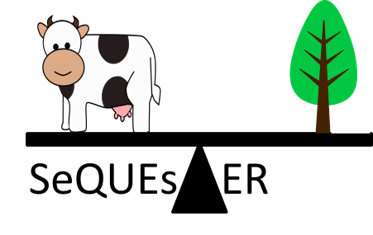Project context

Agrifood sector
Ireland’s agri-food sector generates 7% of gross value added and 10% of Ireland’s exports. Foodwise 2025 aims to increase the value of agri-food exports to €19 billion per year by 2025, creating an additional 23,000 direct jobs, but in a manner that does not harm the environment.
Climate change & nutrient leakage
Agriculture (primarily dairy and beef produciton) contributes over 32% of Ireland’s greenhouse gas (GHG) emissions which continue to increase – despite EU & national policy targets for large emissions reductions to achieve climate stabilisation, as formalised in The Paris Agreement. Agriculture is also a major contributor to nutrient leakage, in forms such as ammonia, nitrate and phophate, polluting water and air. Across the EU, leakage of reactive nitrogen costs hundreds of billions of euros each year.
Forestry in Ireland
Meanwhile, Ireland has a comparatively low forest cover despite climatic conditions that support rapid tree growth. There is strong policy interest in carbon sequestration through forestry expansion to offset agricultural GHG emissions, with an ambition to achieve “carbon neutrality” in the AFOLU sector by 2050. National GHG mitigation from forestry expansion will also depend on long-term management of forests and harvested wood. Product substitution through use of harvested wood products for e.g. construction or bioenergy, could help mitigate emissions from other sectors of the economy, e.g. industry and power generation.
Agricultural Displacement
Current projections suggest that there will be a huge increase in demand for food, especially livestock products, by 2050. In this context, reduced livestock production in Ireland could simply result in displacement of production and associated environmental impacts to other countries. However, between 30 and 40% of global food production is wasted, and globally more people are over-nurished than under-nourished. There are trends towards lower consumption of livestock products in some industrialised countries. Therefore, there is considerable debate about the possible international consequences of agricultural displacement from, or intensification within, Ireland via trade in agricultural commodities. There is an urgent need for holistic modelling approaches to identify the wider sustainability of agriculture and forestry development in Ireland, from a national and international perspective.
